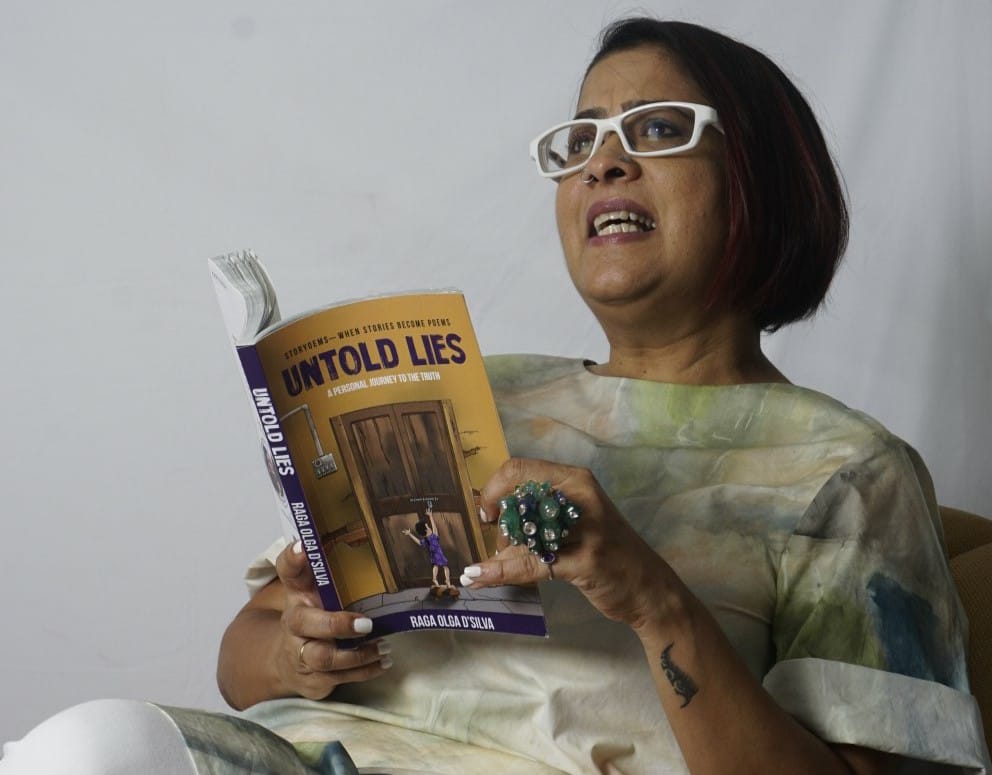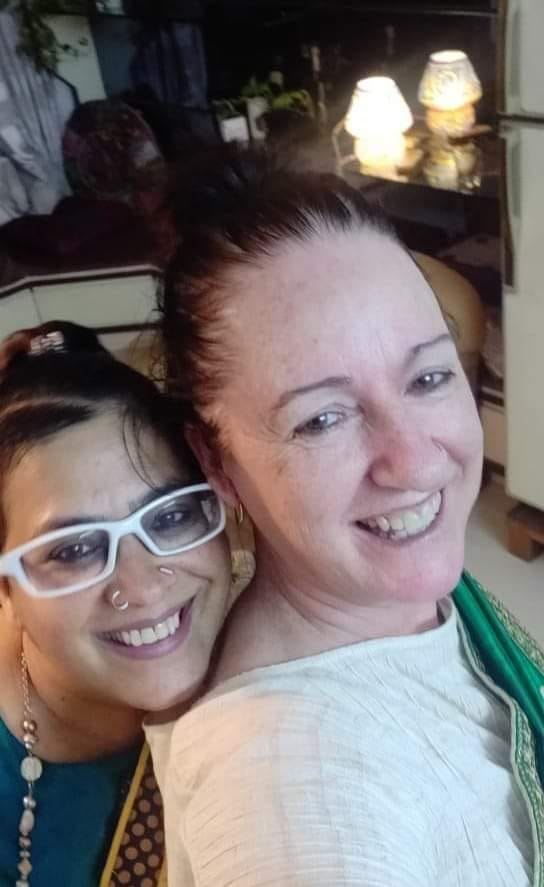For Raga Olga D’Silva, ‘50’ is a special number. “I’ve decided to be 50 for the rest of my life,” she laughs. “It’s a very significant age. This is when I decided that enough was enough.”
In 2019, Raga came out as a lesbian through her book Untold Lies (2019). This is a collection of stories and poems that bind seamlessly to narrate her struggles with her own identity, and how, as her Instagram handle says, she is “totally out now”. Earlier this year, director Onir, who has made films like I Am (2010) and My Brother Nikhil (2005), announced that he will be adapting Raga’s story for a movie he’s working on.
In conversation with The Better India, Raga talks about how a simple Mangalorean girl’s life was chosen to be displayed on the big screen, and what challenges she had to overcome along the way.

‘Looking over my shoulder’
“They say that for women to make changes in their life, they need to be financially independent,” she says. “I have been financially independent all my life, but even then, coming out was difficult. For any woman to make changes in her relationships is still a massive challenge.”
Raga grew up in Kherwadi in Bandra, Mumbai, in a traditional Mangalorean household as the youngest of three children. Her father passed away when she was six years old, leaving her mother in-charge of all responsibilities.
Amid tough times, Raga looked forward to going to school, and loved reading so much that often, she would sit beside the local chana waala and collect the newspapers used to serve the peanuts to read the stories written inside. A simple love for storytelling was ever present, and she worked tirelessly to break the cycle of poverty and realise her dream.
Meanwhile, she notes that in the 70s and 80s, there were no reference points of the lived experiences of the LGBTQ community. “In fact, until the 90s, my perception was that ‘gay’ was used only for a man, or to denote happiness. People would use the term ‘homos’, which was extremely derogatory. I never even thought that two women could love each other,” she says.
She adds, “In my 20s, I fell deeply in love with a woman, but I thought it was a passing phase and something that was not normal.”
So in 1995, Raga married her best friend. The two later had twins. For a while, things seemed to be going well. But when the family moved to New Zealand in 2002, Raga’s marriage began to break down. To cope with the massive changes taking place in her familial life and within her own heart, she penned a letter to a friend, in which she wrote about the difficult period she was going through, and how she was considering dating women, something that she had thought about all her life.
But she never sent the letter, and instead, stashed it away in her cupboard. Around the same time, Raga’s mother flew in from India to New Zealand to visit her.
As it turned out, her mother had read the letter, and one night, as Raga was putting her young twins to sleep, she found her mother hovering over her with a knife.
In a voice as steely as the blade she held, her mother screamed, “How dare you? You brought shame to the family. I wish you weren’t alive. How can you put your children and family through this?”
Many things changed that night, Raga says. What followed was months of separation and heartache, along with a relentless feeling of guilt. “I wanted to grow and explore. But for women, guilt is ever present when we think about ourselves — it’s considered selfish. Separating from my husband was a massive challenge. In a new country, how do you leave your family? What will happen to the children? These are doubts that take time to go away.”
As Raga began a slow process of growth and exploration, she familiarised herself with the fact that she had always preferred women. “I finally asked myself if that is something I should explore. I was in New Zealand, which has better integration of same-sex couples and many anti-discriminatory policies in place,” she says.
Raga slowly began dating women, but she notes, “You know how easy it is for Indians to find gossip. We like to mind everybody’s business. So as people in the community began finding out that I was a lesbian, I started facing a lot of harassment. People would vandalise my car with extremely cruel messages. Friends stopped inviting me to social gatherings. I’d get strange stares that made me feel uncomfortable. My family in India had stopped talking to me.”
She adds, “I was in a very senior position at a large agency in New Zealand, and even at work, I could sense the homophobia. Subtle comments and gossip were daily routine. I was never invited to work parties. The worst thing was that my subordinates were given work directly, often without my own knowledge. I was kept out of the loop.”
However, one incident in particular left Raga shaken to her core. “One weekend, I took my kids out. They were hungry so we decided to go into a local grocery store run by an Indian family,” she says.
As she was picking out items, she heard a shout — “Lesbian! Homewrecker!”. She turned to see a small, sari-clad woman, who shoved Raga to the ground, and as she tried to grasp what was happening, the woman kicked her and spat on her face.
The shopkeeper ran to her rescue, and Raga’s children burst into tears. She ran out of the store with her children, and hurriedly unlocked her car with trembling fingers. Her children were left with a deep fear of going out for the longest time, and to date, Raga says she constantly looks over her shoulder.
The years Raga had spent building her career despite her rough childhood, the awards and accolades, and all her achievements suddenly seemed to no longer matter. “My life suddenly became solely about my sexuality, and not the person I was,” she recalls.
A million pieces put back together
Around 14 and a half years ago, Raga met Nichola, her current partner. “By the time I met her, I’d been through so much that I was in a million pieces. But she put the pieces together, one day at a time. I don’t know where I’d be if it weren’t for her. She is thoughtful and kind, and so respectful. She held my hand as I struggled to come out for 14 years. When we’d go out for family gatherings, people would ask, ‘Who is she? Your friend? Your business partner?’ I never bothered to correct them. She patiently lived through that. I was in a closet but she didn’t have to be. Yet, she sat inside with me anyway. When I’d talk about my children, and people would ask Nichola if she had any of her own, she’d quietly reply, ‘Raga’s children are like my own’. She brought them up but could never take credit for it. She’s a beautiful human being.”

It was on Nichola’s suggestion that Raga wrote Untold Lies. So, at the age of 50, Raga embraced her truth. About the idea of telling her story, she says, “Were there other women and men like me, who were married not because they wanted to be, but because society told them they had to?”
Along these lines, Raga hosts a series of shows, most recently the ‘Coming Out Stories From India’, which chronicles the lives of the members of the LGBTQ community. “We wanted to give people lived experiences so that others struggling to come out may not feel like they were unaware that it’s possible to live your life freely,” she notes. “Nichola and I want to leave behind a legacy.”
Speaking about how Onir was inspired to tell her story on the silver screen, Raga says, “No matter what medium we choose — movies, books, news reports — information needs to be given in an ethical and correct way. When you’re making films on these topics, you also need to consult members of the community. In Bollywood, the LGBTQ community has always been represented as caricatures. Their portrayal is often false and invites ridicule. So those watching don’t want to be associated with the community. Moreover, how often have we seen mainstream actors portray lesbians?”
She adds, “When I met Onir, I asked him, ‘You make lovely films, but where are the women’s stories?’ A week later, he called me and asked me to write a story, which I loosely based on my own, and so, our project began. The love story differs slightly from that of mine and Nichola’s, but the characters, like the mother, are all the same. In cinema, you do take some creative liberties, after all.”
Speaking of the way her life has changed over the course of 20 years, Raga notes, “My ex-husband did take a long time to come to terms with our new reality, but today, he is our strongest ally. People had told me that I was breaking our family apart, so I vowed that I would hold it together. Today, he’s a wonderful friend to both Nichola and I, in addition to a great parent to our twins. We’re a modern family.”
She adds, “The day after Untold Lies was released, when Nichola and I went to work, there was a sort of eerie silence — it was almost uncomfortable. People would just fall shut whenever we passed by. A few days later, one person came up to us to say, ‘Thank you for sharing your story. We’re so proud of you’. Then almost overnight the situation thawed. People came together to congratulate us. They were supportive.”
Raga further adds, “There were many layers of acceptance. My first acceptance was from me, for me. There had been so much homophobia around me that I became internally homophobic as well. Second, after my book came out, my extended family finally reached out to me and said they were proud of me and that they were sorry. It did take them 20 years to say it. Our family is extremely religious and conservative, but their acceptance of me was the most wonderful thing.”
To those struggling to come out and embrace their identities, Raga says, “Be patient. Coming out depends on various factors, including your family’s situation. So plan it well. Come out if you feel safe. For example, during the COVID-19 lockdown in the UK, the global LGBTQ community said, ‘Don’t come out’, because we were all confined within our homes and smaller spaces, and so if your parents reacted poorly, you’d be stuck. An extreme reaction is that you could be thrown out. So make sure you feel safe and give your loved ones time to understand.”
To know more about Raga’s work, including her series ‘Coming Out Stories From India’, you can visit her website, YouTube channel, or Instagram.
For those struggling and in need of help, you can contact NGO SPACE’s helpline – 1800111015.
Edited by Yoshita Rao
No comments:
Post a Comment